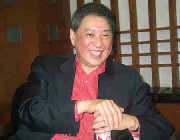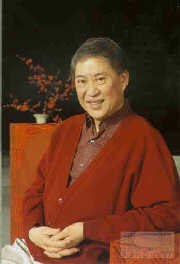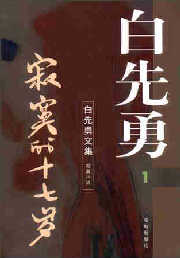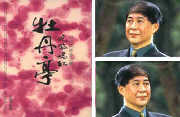
 "My career is writing short stories, but my passion is Kunquopera." These are the words of Bai Xianyong, one of modern Chinese literature's most famous short storywriters as well as a literature professor who recently turned to a new project --Kunquopera.
"My career is writing short stories, but my passion is Kunquopera." These are the words of Bai Xianyong, one of modern Chinese literature's most famous short storywriters as well as a literature professor who recently turned to a new project --Kunquopera.
The youth-version PeonyPavilionhe worked out with first-class creativity designers from Chinese mainland,Hong KongSpecial Administrative Region, and China'sTaiwanProvince has been staged in Taiwan, Hong Kong,Suzhou(East China'sJiangsu Province),Beijing, andShanghai, attracting large crowds of young people wherever it goes.
Peony Pavilion, like West Chamber andA Dream of Red Mansions
, is another pinnacle of Chinese romantic literature. Famed for its elegant lyrics and beautiful melodies, the play has been a classic repertoire ofKunquopera. The widespread popularity of Peony Pavilion has given a boost to the once depressedKunquopera, which is inseparable from Bai Xianyong's continuous efforts.
Aiming to endear more people to the charm ofKunquopera, Bai, a self-claimed lifelong devotee ofKunquopera, devoted enormous time and money to forge the youth version, which has been staged on many campuses, attracting large crowds of young people in each place. As Bai said, he hopes those who watch the opera will become promoters ofKunquopera by producing Kunqu operas on their own, or at least by supporting and following the opera.
following the opera.
 A Brief Introduction of Bai Xianyong
A Brief Introduction of Bai Xianyong
Bai Xianyong, a contemporary writer, was born in 1937 inGuilinof South China'sGuangxiZhuang Autonomous Region. The son of Bai Chongxi, a general of the Kuo Min Tang, Bai spent his childhood in Southwest China'sChongqingMunicipality, and later moved with his parents to live inNanjing(Jiangsu), Hong Kong, and finally Taiwan.
After graduating from Taipei Chien Kuo High School, Bai entered Tainan Cheng Kung University and a year later, began his studies at the Foreign Language Department of Taiwan University.
 In 1963, two years after his graduation from university, Bai went to the United States for research with the Writers Studio of Iowa University, and received a master's degree two years later. Since then, he has taught at California University.
In 1963, two years after his graduation from university, Bai went to the United States for research with the Writers Studio of Iowa University, and received a master's degree two years later. Since then, he has taught at California University.
He has published a number of books, including several short story collections in the magazines Lonely Seventeen, Taipei People, and the New Yorker, a prose collection titled Mo Ran Hui Shou, and a long novel called Nie Zi (Unfilial Son), and so on. Through combining modern western writing skills of modern western literature and traditional Chinese expressions, Bai portrays the stories and lives of those people in a transitional period; hence his literary works are filled with historical ups and downs as well as the vicissitudes of life.
Bai took fancy toKunquopera when he was still a small boy, and his novel Waking From a Dream (You Yuan Jing Meng) is an inspiration from Peony Pavilion. Passionately devoted toKunquopera, he has volunteered in promoting the opera for more than twenty years.
In recent years, he has relentlessly worked in introducing the art to the young generation by cooperating withKunquartists in Hong Kong and Taiwan and delivering lectures. To produce a youth-version of Peony Pavilion has long been one of his dreams: In 2004, his dream finally came true.
 Inextricable Guilin Complex
Inextricable Guilin Complex
Bai's uncommon life experience and emotional world molded his particular personality. Any one who is acquainted with contemporary Chinese literature knows very well Bai's position in contemporary Chinese literature, especially in contemporary Taiwanese literature. However, Bai Xianyong's literary works, his interests and hobbies, his language, and his thoughts are all inseparable from Guilin, his birthplace. Bai has always embraced an inextricable Guilin complex.
Though Bai lived in Guilin for only seven years, he can speak real authentic Guilin dialect and has employed the dialect in many of his novels, imparting a unique flavor to his works. One of his novels is titled Grand ma Jin, which to the locals is imbued with a touch of Guilin flavor.
Bai Xiongyong is also a lover of Guilin rice noodles. As he recalls, once when his father came back from a battle, the first thing he did was to have a bowl of hot rice noodles. Later, when living in Nanjing and Shanghai, Bai's family also invited people to cook Guilin rice noodles. After moving to Taipei, however, Bai seldom had the chance to enjoy the rice noodles. In one of his famous novels, Bai vividly related the story about rice noodles.
 In September 1993, when he returned to Guilin, the first thing he did upon entering a hotel was to ask whether hot Guilin rice noodles were available. As the servant gave him a positive answer, he shouted out "Two Bowls." In his eyes, the noodle is the most delicious food in the world.
In September 1993, when he returned to Guilin, the first thing he did upon entering a hotel was to ask whether hot Guilin rice noodles were available. As the servant gave him a positive answer, he shouted out "Two Bowls." In his eyes, the noodle is the most delicious food in the world.
During his second visit to Guilin in March 2000, Bai repeated what he did in 1993. Apart from Guilin dialect and Guilin rice noodles, Bai is also a fan of traditional Guilin operas. Prior to leaving Guilin at seven, Bai used to watch Guilin operas in his mother's arms and when he returned at 57, his passion for the opera was just as strong.
 Bai Xianyong's Novels
Bai Xianyong's Novels
When still in primary and middle school, Bai was influenced by Chinese classics and new "May Fourth" literary works. He published his first short story Grandma Jin in Taiwan's Literature Magazine at the age of 21, causing a huge sensation among literature circles. Later, with his father's support, Bai, together with his classmates Chen Ruoxi and Ou Ziyang, started a magazine called Modern Literature, in which he published many short stories.
Childhood memories and a drifting life have accumulated rich materials for Bai's literary creations, Chinese classic novels and new "May Fourth" literary works helped him to become a well-known contemporary writer, and Lonely Seventeen, Taipei People, and the New Yorker laid the foundation for his important position in China's literature circles.
literature circles.
In terms of contents, Bai's works can be categorized into four types. The first type covers his early works, which mainly depict his life experiences as a young boy, or which are modeled on western literary works; these include most of the stories in Lonely Seventeen. His works of the second category are about the life of Taiwan's upper class and are included in magazines, such as Taipei People. The third type of stories is about the lives of the intellectual residing in America, and is included in magazines such as the New Yorker. The last type is mainly on the lower class of Taiwan people, with the long story Nie Zi (Unfilial Son) being the representative work.
Bai's early works were greatly influenced by western literature and were immature in both psychology and art. His later works, however, carried on Chinese literature traditions and featured a strong sense of reality and history.
 Bai is seen as a writer of strong realism in Taiwan's modern literature circles, which is accredited to his life experiences at different ages and in various social environments. Born into the family of a Kuo Min Tang official, he was deeply impressed by the eminence of his ancestors and the imposing manner of the upper class as a child. After arriving in Taiwan, the deterioration of Kuo Min Tang officials and the agonies of the lower class in Taiwan as well as his homesickness and nostalgia also influenced Bai's literary creation. While in America, he struggled between his disgust with Americans' material pursuit and his agonies from a wandering life overseas. All these experiences and emotions have been reflected in his literary works to a certain extent.
Bai is seen as a writer of strong realism in Taiwan's modern literature circles, which is accredited to his life experiences at different ages and in various social environments. Born into the family of a Kuo Min Tang official, he was deeply impressed by the eminence of his ancestors and the imposing manner of the upper class as a child. After arriving in Taiwan, the deterioration of Kuo Min Tang officials and the agonies of the lower class in Taiwan as well as his homesickness and nostalgia also influenced Bai's literary creation. While in America, he struggled between his disgust with Americans' material pursuit and his agonies from a wandering life overseas. All these experiences and emotions have been reflected in his literary works to a certain extent.
 Lifetime Devotee ofKunquOpera
Lifetime Devotee ofKunquOpera
For Bai Xianyong, emotionally, writing is on one side andKunquopera on the other side. Writing is his mission and target, whileKunquis his love as well as mission. Bai became attached toKunquas early as in the 1940s, when as a 9-year-old he first watched aKunquopera -- Waking From a Dream (You Yuan Jing Meng) -- performed by two masters - Mei Langfang and Yu Zhenfei. Since then,Kunquhas been rooted in his heart.
One of Bai's famous novels, Waking From a Dream (You Yuan Jing Meng), reveals his passionate love for the opera. In the 1980s, he participated in the production of Peony Pavilion in Taiwan, and he once commuted between Shanghai and Nanjing just to watchKunqumasters' performances. In the early 1990s, he joined the production of Peony Pavilion again, and invited Hua Wenyi, a renownedKunquperformer in Shanghai, to perform in Taipei. Bai personally selected the fans used in the play, displaying his very careful attention to detail.
One of his books, Taipei People, features aKunquactor, and was later adapted into a drama, causing a sensation in all of Taiwan and running many performances in Shanghai and Hong Kong.
 Kunquopera, boasting a history of over 600 years, is a combination of beautiful music, dance, and literature. Having been continuously refined for over 400 years, the opera represents the aesthetic pinnacle of Chinese performance art. Despite its past glory and the government's efforts in trying to preserve the art, however,Kunquopera has been going downhill over the recent years.
Kunquopera, boasting a history of over 600 years, is a combination of beautiful music, dance, and literature. Having been continuously refined for over 400 years, the opera represents the aesthetic pinnacle of Chinese performance art. Despite its past glory and the government's efforts in trying to preserve the art, however,Kunquopera has been going downhill over the recent years.
On May 18, 2001, ChineseKunquopera was listed on top of the first UNESCO's 19 "Oral and Intangible Heritages of Humanity," greatly encouraging Bai. From then on, he has shouldered the responsibility of invigorating the art ofKunquopera.
For this reason, he accepted speech invitations from Hong Kong University and the Hong Kong Culture Promotion Center, delivering four lectures onKunquopera to the students and common people. The young people's love for the art inspired him to produce the youth-version Peony Pavilion.
Bai's eminent achievements in literature and illustrious family background helped a lot during the process of producing the youth-version Peony Pavilion, without his consistent resolution and efforts, the project would not had been so successful.
As a result of his promotion ofKunquopera on the campus, more and more young people have become acquainted with and have begun to love the traditional art. His efforts might ultimately reverse the fate of Kunqu opera, an excellent oral and intangible heritage of humanity.
Author: Jessie

Presented by Chinadaily.com.cn Registration Number: 10023870-7
Copyright © Ministry of Culture, P.R.China. All rights reserved